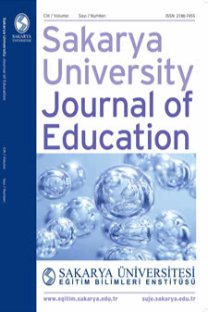Examination of the Relationship Between Social Studies Teacher Candidates of Pre-Service Teacher Identity Levels And Possible Self-Esteem Levels
Examination of the Relationship Between Social Studies Teacher Candidates of Pre-Service Teacher Identity Levels And Possible Self-Esteem Levels
___
- Aslan Yılmaz, H. (2016). A Review: Some approaches and definitions related to the concept of self. Journal of Social Sciences, 48, 79-89.
- Aslan, E. (1992). The concept of self and the effects of the individual's life. Marmara University Atatürk Faculty of Education Journal of Educational Sciences, 4, 7-14
- Aykaç, N. (2007). Teachers' views on primary education social studies curriculum. Journal of Electronic Social Sciences, 6(22), 46-73.
- Bacanlı, F. (2005). Examining the compatibility between the self-concept and professional self-concept of psychological counselor candidates: a longitudinal study. Educational Sciences in Theory and Practice, 5(2), 586-616.
- Barth, J., & Demirtaş, A. (1997). Primary social studies teaching. Ankara: YOK / World Bank Publications.
- Büyüköztürk, Ş. (2017). Data analysis manual book (23. Printing). Ankara: Pegem Academy Publications.
- Büyüköztürk, Ş., Çakmak, K. E., Akgün, Ö. E., Karadeniz, Ş., & Demirel, F. (2016). Scientific research methods (21. Edition). Ankara: Pegem Academy Publications.
- Çetin, G. (2017). The prospects achievement of professional objectives of teacher candidates' and their beliefs about their accessibility: the role of teacher identity and possible self. Unpublished Master Thesis, Abant Izzet Baysal University, Institute of Educational Sciences, Bolu.
- Çoştu, Y. (2009). A sociological evaluation on the concept of socialization. Journal of Dinology Researches, 9(3), 117-140.
- Deveci, H. (2010). Social studies education in the history of Turkish education. Turan, R. & Ulusoy, K. (Ed.). Fundamentals of social studies (pp.20-56). Ankara: Maya Academy.
- Durmuşoğlu, M. C., Yanık, C., & Akkoyunlu, B. (2009). Attitudes of Turkish and Azeri teacher candidates towards the teaching profession. Journal of Hacettepe University Faculty of Education, 36, 76-86.
- Ertürk, S. (1997). Curriculum Development in Education. Ankara: Meteksan Publishing.
- Etsuko, Y. (2009). New trends in the study of social education. Educational Studies in Japan: International Yearbook, 4, 27-35.
- Gökçe, F. (2014). State and education in the process of change (6. Printing). Ankara: Pegem Academy.
- Hamman, D., & Wood-Harp, C. (2007). Possible selves theory and why new teachers leave. International Journal of Arts & Sciences, 2(1), 1-3.
- Kabapınar, Y. (2007). Teaching life and social studies in primary education. Ankara: Pegem Academy Publishing.
- Markus, H., & Nurius, P. (1986). Possible selves. American Psychologist, 41(9), 954-969.
- Özabacı, N., & Acat. M. B. (2005). Comparison of Teacher Candidates ' Perceptions of Their Own Characteristics and Ideal Teacher Characteristics. Journal of Educational Administration Theory and Practice, 42, 211-236.
- Öztürk, C. (2006). Social studies: an interdisciplinary perspective on social life. Constructivist approach to teaching life science and social studies. Ankara: Pegem Academy Publishing.
- Özyürek, M. (2005). Approaches to individual differences. Ankara: Root Publishing.
- Soğukpınar, E. (2014). Examination of the level of self-esteem and professional self-esteem of guidance teachers in terms of various variables. Unpublished Master's Thesis, Inönü University, Institute of Educational Sciences, Malatya.
- Sunal, C. S., & Haas, M. E. (2005). Social studies for elementary and middle grades a constructivist approach (2th Edition). Pearson Education.
- Şişman, M. (2007). Introduction to educational science. Ankara: Pegem Publications
- ISSN: 2146-7455
- Yayın Aralığı: 3
- Başlangıç: 2011
- Yayıncı: Sakarya Üniversitesi Eğitim Bilimleri Enstitüsü
Öğretmenlerin Öznel İyi Oluşları İle Mesleki Dayanıklılıkları Arasındaki İlişkinin İncelenmesi
Kamil UYGUN, Mehmet Akif KARALI
Yabancı Dil Öğretmenlerinin Değerlendirme Okuryazarlığının İncelenmesi
Emine PEHLİVAN ŞİŞMAN, Kağan BÜYÜKKARCI
Türkiye’de Mesleki ve Teknik Ortaöğretimin Gelişimi
Subhan EKŞİOĞLU, Mehmet TAŞPINAR
Recep ÖZ, Mehmet YAZICI, Murat Tolga KAYALAR, Yasemin ÇAKMAK YILDIZHAN
An Investigation of Pre-Service and In-Service Teachers’ Perceptions of Teacher Quality in Turkey
Görsev SÖNMEZ BORAN, Nuri Can AKSOY, Burcu GÜRKAN
Güneri Civaoğlu’nun Köşe Yazılarında Bağlaçların Kullanımı: Metindilbilimsel Bir İnceleme
Kamil UYGUN, Mehmet Akif KARALI
BİLİŞSEL DUYGU DÜZENLEME VE DUYGULARI YÖNETME ARASINDAKİ İLİŞKİNİN İNCELENMESİ
